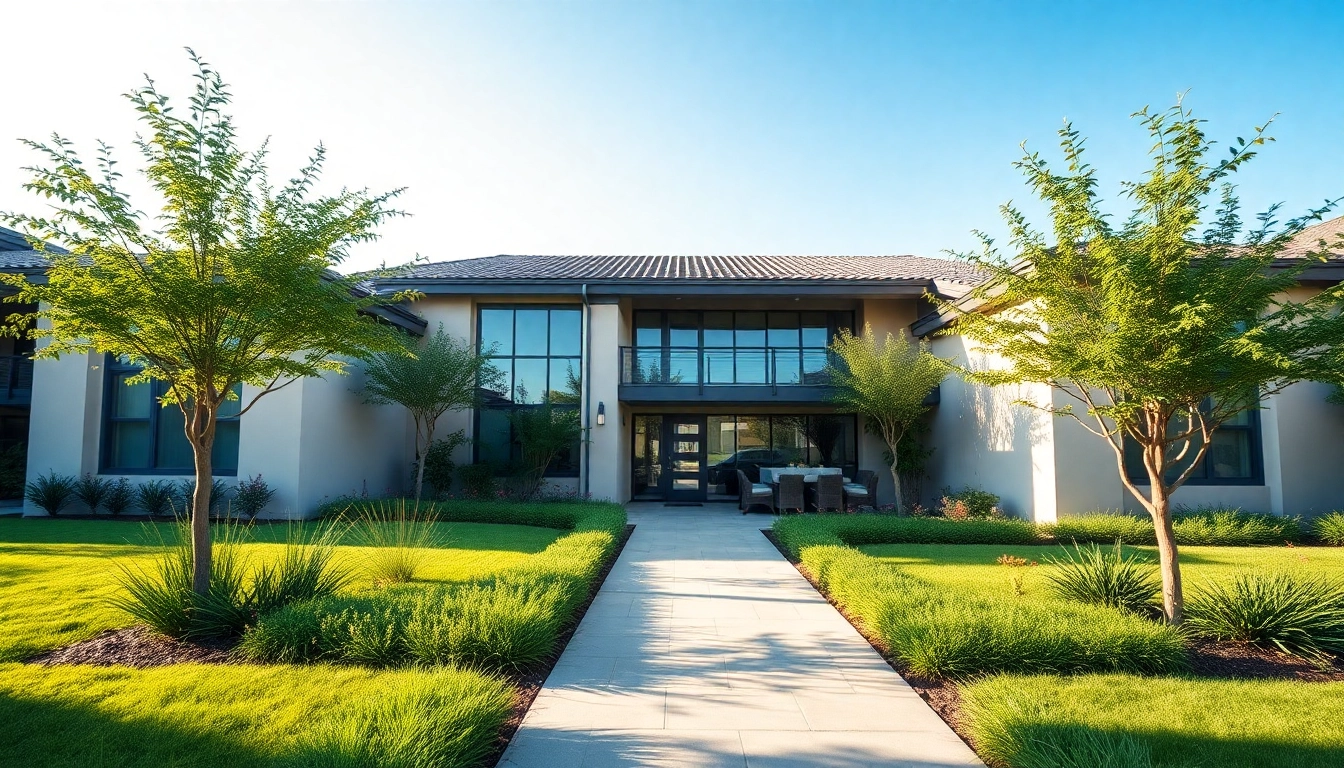Understanding Rental Property Management
Rental property management is a vital aspect of real estate that encompasses various responsibilities, including leasing, maintenance, and tenant relations. Understanding the nuances of rental property management is crucial for landlords and property owners who wish to maximize their investment. Effective management not only influences the operation of a rental but also impacts the financial success of the property. This article explores the fundamental components of rental property management, best practices, tools available, challenges faced, and strategies to measure success.
What is Rental Property Management?
Rental property management refers to the operation, control, and oversight of residential, commercial, or industrial properties. It involves a series of tasks to ensure that properties are well-maintained, profitable, and appealing to tenants. This can include marketing the property for rent, screening and managing tenants, handling leases, ensuring compliance with regulations, and maintaining the physical integrity of the property.
The Importance of Effective Property Management
Effective property management is crucial for several reasons:
- Financial Performance: Proper management helps maximize rental income, minimize vacancy rates, and ensure effective expense control.
- Tenant Retention: A good property manager enhances tenant satisfaction, leading to longer lease terms and lower turnover costs.
- Legal Compliance: Experienced property management ensures compliance with all laws and regulations, reducing the risk of legal issues.
- Maintenance and Upkeep: Regular maintenance helps preserve property value and prevent costly repairs.
Key Terms in Rental Property Management
Familiarity with key terms can help landlords communicate effectively and make informed decisions in property management:
- Lease Agreement: A legal contract between landlord and tenant outlining the terms of renting the property.
- Tenant Screening: The process of assessing potential tenants to ensure they are reliable and responsible.
- Eviction: The legal process of removing a tenant from a property, usually due to non-compliance with lease terms.
- Capital Expenditures: Major expenses incurred to improve or prolong the life of the property, like roof replacements or major renovations.
Best Practices for Managing Rental Properties
To manage rental properties effectively, landlords should adhere to established best practices.
Streamlining Tenant Screening Processes
Effective tenant screening is one of the most important steps in rental property management. A thorough screening process can help identify reliable and responsible tenants. Here are some best practices:
- Application Form: Use a comprehensive application form that collects essential information about the applicant.
- Background Checks: Conduct background checks, including credit history, rental history, and criminal background, to assess the applicant’s reliability.
- Income Verification: Ensure that potential tenants have a stable income that meets your rental criteria, typically three times the monthly rent.
Setting Competitive Rental Rates
Setting the right rental rate is crucial for attracting tenants while ensuring optimal returns. Consider the following tips:
- Market Research: Analyze comparable properties in the area to determine competitive rental rates.
- Seasonal Trends: Monitor seasonal changes in demand to adjust pricing accordingly.
- Evaluate Expenses: Understand your operating costs to ensure rental rates cover expenses while remaining attractive to tenants.
Ensuring Compliance with Local Laws
Landlords must adhere to state and local regulations concerning rental properties. Key compliance areas include:
- Fair Housing Laws: Ensure non-discriminatory practices when renting to tenants based on protected characteristics.
- Building Codes: Maintain compliance with local building codes to ensure the property is safe for tenants.
- Lease Agreements: Utilize legally binding lease agreements that incorporate local laws and regulations.
Tools and Technologies for Property Management
In today’s digital age, leveraging tools and technologies can significantly enhance property management efficiency.
Property Management Software Options
Property management software provides essential tools for managing rental properties. Key features to consider include:
- Tenant and Lease Tracking: Monitor tenant details and track lease expiration dates to ensure timely renewals.
- Online Payment Systems: Allow tenants to pay rent online, simplifying the collection process.
- Maintenance Management: Streamline maintenance requests and track repairs efficiently.
The Role of Automation in Rental Management
Automation can significantly improve efficiency in property management. Consider the following automated processes:
- Automated Alerts: Set up automated reminders for lease expirations, upcoming maintenance, and rent due dates.
- Online Applications: Streamline tenant applications through online forms that automatically feed into your management system.
- Communication Tools: Use automated messaging systems to communicate with tenants regarding updates and reminders.
Tracking Finances and Expenses
Keeping a close eye on finances is vital in property management. Best practices include:
- Expense Tracking Software: Utilize software to log and categorize expenses accurately.
- Budget Planning: Develop annual budgets that account for seasonal expenses and anticipated repairs.
- Financial Reporting: Generate monthly reports to evaluate income and expenses, providing insights for improvement.
Challenges in Rental Property Management
While managing rental properties can be profitable, it also comes with challenges. Recognizing these issues is the first step to overcoming them.
Handling Difficult Tenants
Dealing with difficult tenants can be a significant challenge. Strategies for managing this include:
- Clear Communication: Establish clear communication with tenants regarding expectations and policies.
- Document Everything: Keep detailed records of all communications and agreements with tenants to protect yourself if disputes arise.
- Mediation: Consider mediation for disagreements to reach mutually beneficial resolutions.
Addressing Maintenance and Repairs
Timely maintenance and repairs are crucial for tenant satisfaction. Best practices for address maintenance include:
- Regular Inspections: Schedule routine inspections to identify potential issues before they escalate.
- Maintenance Requests: Implement a system for tenants to report maintenance issues efficiently.
- Emergency Contacts: Provide tenants with emergency contacts to ensure urgent issues are addressed swiftly.
Transitioning Between Tenants Effectively
The turnover process can be daunting. Streamline transitions with these strategies:
- Move-Out Inspections: Conduct thorough inspections after tenants vacate to assess property condition.
- Marketing Early: Begin marketing the property before the current tenant moves out to reduce vacancy time.
- Cleaning and Repairs: Ensure the property is clean and any necessary repairs are made before new tenants move in.
Measuring Success in Property Management
Tracking success in rental property management involves evaluating various performance metrics.
Evaluating Tenant Satisfaction
Tenant satisfaction is vital for long-term success. Strategies for evaluation include:
- Surveys: Use tenant satisfaction surveys to gather feedback about their experience and areas for improvement.
- Responsive Communication: Regularly check in with tenants regarding their needs and address concerns promptly.
- Retention Rates: Analyze tenant retention rates to gauge satisfaction and identify trends.
Tracking Financial Performance Metrics
Financial metrics provide insights into the financial health of rental properties:
- Net Operating Income (NOI): Calculate NOI to understand profitability after operating expenses.
- Return on Investment (ROI): Measure ROI to determine the efficiency of your investment in the property.
- Vacancy Rates: Monitor vacancy rates to evaluate the effectiveness of your rental strategy.
Continual Improvement Strategies
Establishing a culture of continual improvement is essential for long-term success in property management:
- Regular Training: Provide ongoing training for property management staff to stay updated on best practices and regulations.
- Adaptability: Be willing to adapt strategies based on tenant feedback, market conditions, and operational challenges.
- Performance Reviews: Regularly review performance metrics and adjust strategies as needed to enhance management effectiveness.
In conclusion, mastering rental property management encompasses understanding key principles, implementing best practices, leveraging technology, and addressing challenges effectively. With the right approach, property owners can enhance profitability, tenant satisfaction, and overall performance in their rental businesses.



